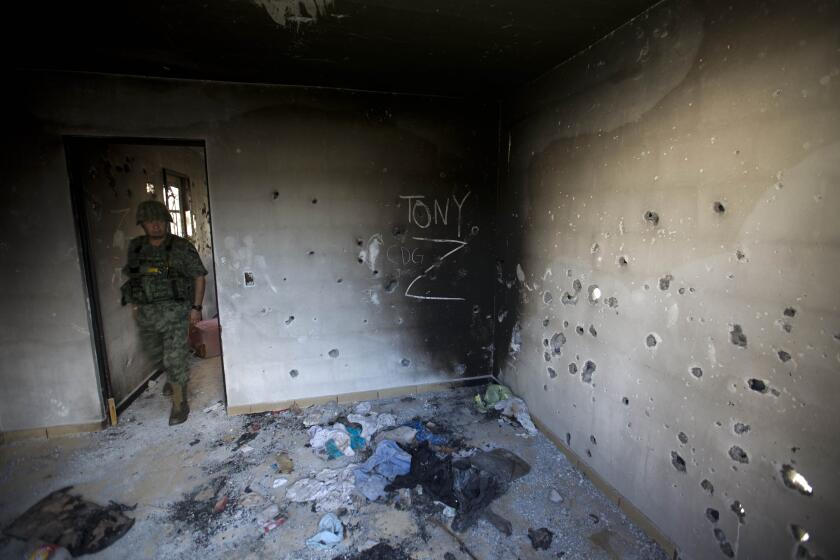Serbs Fall Into Electoral Abyss
The third time wasn’t a political charm in Serbia. The cold and snow didn’t deter Serbs from casting their ballots, though the three uninspiring presidential candidates may have been a good excuse to stay home. But in last Sunday’s elections, the third in as many months, not enough Serbs -- a minium 50% of the eligible electorate is required -- went to the polls to validate the outcome. As a result, the Serbs failed to exercise their constitutional right to directly elect their president.
It was a major blow to democratic reforms begun after the Slobodan Milosevic regime was toppled in 2000. Furthermore, the Serbs’ inability to directly elect their president signals that Serbia is not yet ready to be considered seriously for membership in key European organizations.
Milosevic’s handiwork during his last days in office is partly to blame for Serbia’s lack of progress toward becoming a democracy. The former Yugoslav president crafted the electoral law that requires a 50% turnout in both first-round and runoff elections for president. The constitution dictates that if the voters can’t pick a leader, parliament must.
A primary factor limiting a majority turnout was the inaccurate and out-of-date national voters’ list, which served to inflate the eligible electorate and make the 50% level virtually unattainable. All political parties and observer groups agree that the list was filled with names of the deceased and citizens now living abroad who cannot vote because there is no provision for absentee balloting. Some names were duplicated.
The Serbian government claimed to have updated the voter list since the previous two rounds of presidential balloting. But the list was never made public. Registered voters were allowed to check for their names on the list in their respective municipalities, but candidates and observers -- even interested ministers in parliament -- were barred from viewing the list, which is reportedly stored on a computer in the central government’s offices in Belgrade.
The government’s lack of transparency and inept handling of the voter-list revisions damaged Belgrade’s credibility and prompted some domestic observer groups and political parties to conduct their own surveys to determine how many ineligible names might be on the rolls.
One local party representative in Zajecar told me that his party had estimated that more than 600,000 voters, roughly 9% of the total electorate, on the latest revised national list were invalid because their names were obvious duplicates, unrecognizable at the municipal level, of dead people and of Serbs living abroad for work. That’s a number that would have made the difference in reaching the threshold for electoral validation.
Another major factor limiting voter turnout was that none of the candidates wooed the youth vote in the three rounds of presidential voting, a stunning political mistake.
This electoral group was probably the most influential in the movement that ousted Milosevic in the 2000 elections and brought about the opportunity for democratic reform. Through organized rock concerts in major cities and other get-out-the-vote activities, the youth in 2000 were mobilized and had a message. Today, while some young people remain active in their parties, many are disenchanted because most of the promises of reform in 2000 have not been kept.
The parties’ failure to target the youth vote illustrated the general shallowness of the campaign. For the most part, candidates simply stated their policies and sometimes criticized their rivals, but never debated the issues. Serb Radical Party candidate Vojislav Seselj’s campaigning consisted mostly of graffiti messages on walls of public buildings or sides of public buses. He held only two campaign rallies.
As one member of parliament described it, the candidates were like “models walking down a catwalk: You either like the outfits they present or you don’t.”
In the absence of a president-elect, the speaker of the parliament will be acting president until the body determines how it will select the first Serb president since the disintegration of Yugoslavia. There is already talk that ministers from the Democratic Party of Serbia, the party of the Yugoslav president and front-running candidate, might boycott a vote to approve the 2003 budget to show their dissatisfaction. This would deepen the political differences that have divided and immobilized the coalition government for months. Salaries and pensions of government workers will be withheld until the budget issue is resolved, which may further fan the flames of labor unrest. Public workers have already rioted in the streets of Belgrade to protest difficult privatization reforms slowly being put into effect.
Serbia’s failure to directly elect a new president was not the only setback last week in its quest to become a regional actor in Europe. Vojislav Kostunica, the Yugoslav president, suggested -- in comments later retracted -- that Yugoslavia would not cooperate with The Hague in extraditing alleged war criminals. In addition, the U.S. warned Serbia that it would regard any Serb violation of U.N. sanctions against Iraq with the utmost seriousness, implying that the country is still illegally exporting arms to Baghdad.
Also last week, high hopes for a federation between Montenegro and Serbia, the two remaining Yugoslav republics, were dashed when Kosovo refused to be considered a part of any such union. The agreement, backed by the European Union, could effectively put an end to the decade-long breakup of Yugoslavia.
Whether Serbia can successfully integrate with the European community, as have the former Yugoslav republics of Slovenia, Croatia and Macedonia, hangs in the balance. Now more than ever, the U.S. and the European Union need to remain engaged in the Balkans, and reward those who are willing to make the difficult and unpopular decisions for change.
More to Read
Sign up for Essential California
The most important California stories and recommendations in your inbox every morning.
You may occasionally receive promotional content from the Los Angeles Times.










